Fostering Environment Restoration and Safeguarding Ecology
ICICI Foundation’s Initiatives on Environment
Environmental restoration is a key priority for the Bank and has been embedded in the CSR activities and initiatives undertaken through ICICI Foundation. The Foundation’s efforts are directed towards biodiversity and forest conservation, plantation, water conservation, waste management, and transition to renewable energy usage. These initiatives and projects are aimed at promoting ecological stability and nurturing the natural ecosystems of communities across the country. Projects implemented by ICICI Foundation in the protected regions like forests, national parks and wildlife sanctuaries also support socioeconomic development of the peripheral villages.
As part of its commitment to environmental conservation, ICICI Foundation has been actively engaging with local communities and institutions to foster green growth across diverse regions. The Foundation’s key initiatives encompass tree plantation, rejuvenation of degraded grasslands and pasturelands, avenue plantation, and agroforestry. Further, the Foundation has supported the construction of various water conservation structures to enhance greenery in arid areas.
Expanding Tree Plantation under Project ‘GhanVan’
In fiscal 2024, ICICI Foundation entered into a collaboration with Tata Power to launch GhanVan, a project aimed at planting native trees compatible with local soil across 75 acres over a five-year period. In phase one, 8,350 saplings were planted across 15 acres in Pune, Maharashtra. In fiscal 2025, phase two was launched with an additional 5,040 saplings across 20 acres were planted. The project was scaled up with plantation at the site of Prayagraj Power Generation Corporation (PPGCL), an affiliate of Tata Power, in Uttar Pradesh.
In Prayagraj, GhanVan focussed on increasing the green cover within the PPGCL ash pond area - an engineered structure utilised for the disposal of ash at coal-fired power stations. The vegetation planted around the pond helps mitigate air-borne dust, prevent soil erosion, and minimise ash dispersion in surrounding area.
Beyond environmental impact, GhanVan aims to preserve regional biodiversity by promoting native species, creating habitats for avian population, generating employment opportunities for local communities and restoring ecosystems, and fostering sustainable development.
1.2 million
Trees planted in fiscal 2025
Steps involved in plantation
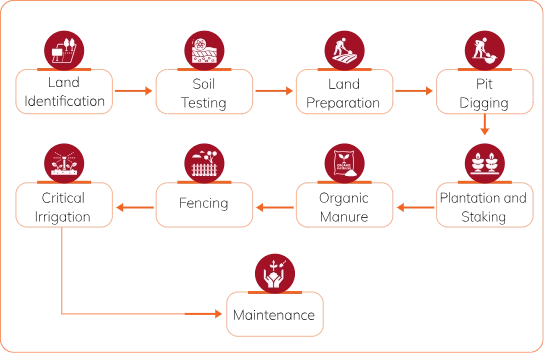
(Best viewed on desktop)
Case Study
Dryland Agroforestry in Gaushalas
ICICI Foundation has partnered with Swabhiman Sansthan, a welfare institution founded by Padma Shri Sundaram Verma, a distinguished progressive farmer from Rajasthan. Through this collaboration, the Foundation implemented plantation projects on gaushala (cow shelters) land, using Dryland Agroforestry—an innovative cultivation technique developed by Sundaram Verma.
Key Benefits of Dryland Agroforestry:
- Enables tree growth using only one litre of water throughout its lifespan.
- Supports survival of plants in drought-prone conditions.
- Ensures consistent fodder availability, thereby improving sustainability of gaushalas.
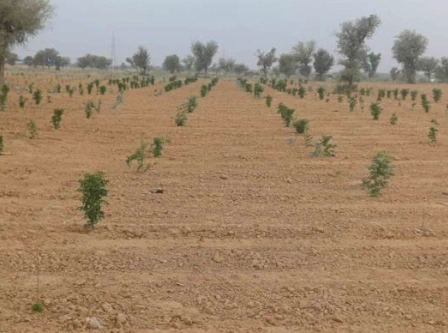
Agroforestry in Panwa village of Jaipur district, Rajasthan
Project implementation: Since fiscal 2022, ICICI Foundation planted 5,000 saplings in two gaushalas and 17,000 saplings across five cities in Rajasthan.
Land Preparation Process:
- Initial Ploughing: Conducted 10 days after the first monsoon rain to remove weeds.
- Water Absorption Phase: Monsoon rains are allowed to percolate into the soil to replenish groundwater reserves.
- Final Ploughing: Performed following the last monsoon rain, rendering the soil porous and devoid of remaining weeds.
- Sapling Planting: Seedlings are planted in precisely measured pits, enabling their roots to penetrate deeply into the soil and thrive on subterranean water resources, thereby reducing dependency on irrigation.
Greening the Arid Landscape:
- The Foundation supported the plantation of 5,000 saplings in two gaushalas, one at Asalpur Jobner, Jaipur district, and the other at Kuchaman, Didwana-Kuchaman district.
- Drought-resistant plantations ensure sustainable fodder and nourishment for cattle.
- Blends traditional wisdom with modern innovation to support biodiversity, reduce carbon emissions and provide a replicable model for dryland afforestation.
- Requires one litre of water per tree for the entire lifespan.
- Controls water loss from soil through controlled evaporation
Environmental and Economic Impact:
- Improves soil fertility, and prevents desertification.
- Generates sustainable employment for local communities.
- Strengthens food, fruit, fodder and fuel production.
- Encourages long-term seedling growth.
Revenue generation will commence in this fiscal leading to a monetary growth of more than 200% cumulatively.
ICICI Foundation remains steadfast in its commitment to protecting India’s forests, designated reserves, and diverse national parks and wildlife sanctuaries. The Foundation employs an integrated approach that harmonises biodiversity conservation with sustainable development in peripheral villages. This multi-faceted strategy has yielded tangible, on-ground outcomes both within and beyond designated forest areas. Collaborating with the state forest departments is central to its conservation initiatives.
In fiscal 2025, the Foundation’s forest conservation efforts focusses on key regions, including Kanha National Park in Madhya Pradesh, Nagarjunasagar Srisailam Tiger Reserve spanning Telangana and Andhra Pradesh, Pench Tiger Reserve straddling Maharashtra and Madhya Pradesh, Ramgarh Vishdhari Tiger Reserve, and Sariska Tiger Reserve in Rajasthan. Concurrently, ongoing projects continued across various other forest areas. Till March 31, 2025, the Foundation has covered 56 forests and tiger reserves across 19 states.
Watch a video on ICICI Foundation’s initiative at the Bhimashankar Wildlife Sanctuary
Key Outcomes - Fiscal 2025
Habitat Restoration
Grassland development across over 14,405 hectares spanning 16 forests
Construction and Rejuvenation of Water Bodies
Establishment and restoration of 350 water structures across 12 forests
Green Energy Initiatives
Installation of over 195 solar panels with 225 kVA capacity, creating grid-free forests
Protecting the Great Indian Bustard’s Habitat
The Great Indian Bustard, Rajasthan’s state bird, is critically endangered and protected under the Indian Wild Life (Protection) Act, 1972. Historically found across India’s dry grasslands, its population has dwindled from 250 in 2011 to an estimated 100 in 2021.
Efforts to safeguard the species have gained momentum, especially in Rajasthan’s arid terrain. In fiscal 2025, ICICI Foundation executed these conservation efforts with Bombay Natural History Society, focussing on habitat restoration in villages surrounding Pokaran town in Jaisalmer district. This initiative revitalised the ecosystem and introduced systematic monitoring processes to evaluate impact of the interventions.
Securing Critical Ecosystem
- Collaborated with Gram Panchayats, fostering local ownership and responsibility.
- Supported habitat restoration in 12 villages of Khetolai- Chacha area within Pokaran Field Firing Range (PFFR).
- Facilitated desiltation and rejuvenation of the water bodies across the region.
Impact and Key Benefits
- Increased fodder availability through grassland development and weed removal for livestock such as cattle, sheep and goats.
- Expanded open spaces, enabling smooth movement of Chinkaras (Indian Gazelle), spiny-tailed lizards, sandgrouse and vultures.
- Enhanced conditions for native flora and fauna restoration.
Case Study
Habitat Restoration in NSTR Tiger Reserve
India’s largest tiger reserve, Nagarajunasagar Srisailam Tiger Reserve (NSTR), located in Andhra Pradesh, plays a critical role in the survival of Bengal tigers and other endangered species. Nestled in the rugged Nallamala Hills of the Eastern Ghats, the tiger reserve extends over 3,725 square kilometres and serves as a vital ecological corridor connecting multiple forest zones.
Recognising its significance, ICICI Foundation implemented conservation initiatives since 2023, promoting wildlife protection and habitat restoration while strengthening forest infrastructure.
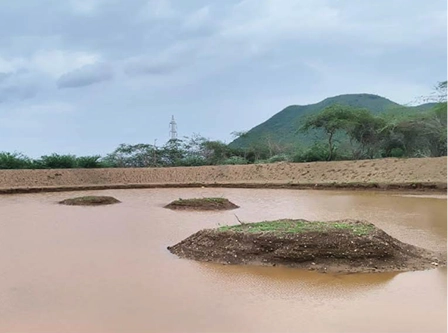
Created a watering hole in Nagarjunasagar Srisailam Tiger Reserve, Andhra Pradesh
Environmental Rejuvenation and Ecological Conservation
- Supported construction of 34 new artificial waterholes to mitigate seasonal water scarcity.
- Facilitated grassland development across 130 hectares, enabling the regeneration of native vegetation.
- Donated 100 fire blowers and 75 grass cutters for effective wildfire prevention and management.
Ecological Conserving Efforts
- Donated five patrolling vehicles for enhanced wildlife surveillance.
- Supported installation of 50 solar panels of one kWh each (cumulative 50 kWh) in patrolling, locations thereby, improving monitoring capabilities of forest officials.
- Supported set up of nine solar-powered water pumps to ensure consistent water supply for wildlife in key hill ranges.
Watch a video on ICICI Foundation’s initiative at the Sariska Tiger Reserve
With water as a key component to sustain life, there are efforts being made globally, including India, to reduce its scarcity and meet the growing demand. ICICI Foundation recognises the need for clean, accessible water sources, especially in arid regions. The Foundation partners with local authorities and administration in the water-stressed areas of the country to promote water conservation and the revival of depleting water sources.
Reviving Ahar Irrigation in Bihar
In fiscal 2025, the ICICI Foundation scaled up its efforts to tackle water scarcity in rural Bihar by restoring Ahar— traditional water harvesting system dating back to the Magadha Empire. Predominantly used in Bihar, this technique uses man-made reservoir to store water (Ahar) collected from rainfall and floods. The stored water is diverted to agricultural fields via diversion channels (Pynes).
Several years of silt accumulation had severely degraded the Ahars. The Foundation revived 29 Ahar systems—23 in Gaya district and six in Nawada district—adding water storage capacity of over 515 million litres annually. This initiative benefitted over 7,800 households across 11,973 acres of farmland, enabling second crop cultivation and increasing crop yield by 15%—25%. Kharif crop coverage rose by 20% while Rabi crop cultivation grew by 40% leading to enhanced farmer income.
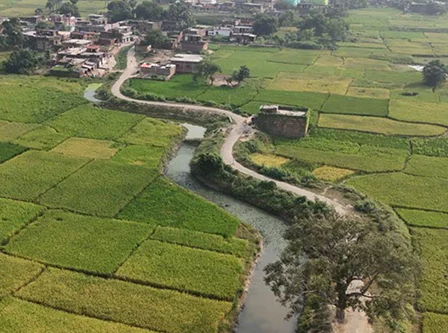
Rejuvenation of Ahar at Belaganj sub-division in Gaya district, Bihar
Pond Rejuvenation in Kachchh, Gujarat
Over the past three years, ICICI Foundation has been strengthening pond rejuvenation and water retention in the arid Kachchh district. In fiscal 2025, 18 more villages benefitted from pond desilting, reducing the impact of water scarcity. This intervention created 242 million litres of additional water storage. Active community participation helped deepen ponds, establishing new river channels that support agricultural productivity and crop diversification, benefitting 1,575 families.
Since inception, the Foundation’s desilting projects have benefitted over 3,500 families across 38 villages, increasing water storage capacity to 682 million litres. Reliable irrigation water has enabled farmers to cultivate more crops and improve yields, securing long-term agricultural sustainability.
Watch a video on ICICI Foundation’s initiative on Pond Rejuvenation in Kachchh, Gujarat
Integrated Watershed Management in Maharashtra
Years of uncertainty and groundwater depletion had led to severe water shortage, affecting both people and livestock, in Sonegaon village, Dharashiv, Maharashtra. To address this, ICICI Foundation set up an integrated watershed management project in the village in 2025.
The project improved water security by raising groundwater levels, expanding green cover, and boosting climate resilience. Efforts included creation of 137 new borewells, 38 farm ponds and two community ponds, and continuous contour trenches, water absorption trenches, gabion structures, gully plugs and percolation pits.
Overall, the initiative recharged 126 million litres of groundwater annually, benefitting 370 households and revitalising nearly 1,295 acres of land. The intervention restored 104 wells and 895 borewells, ensuring long-term access to irrigation.
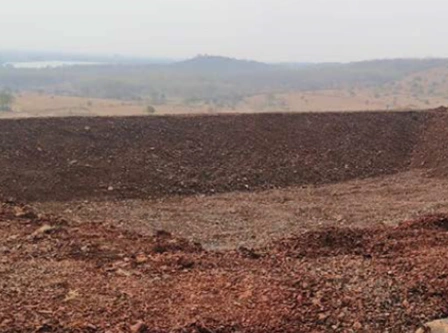
Creation of farm pond at Sonegaon village in Dharashiv district, Maharashtra
Water Conservation Structures in Telangana
In fiscal 2025, ICICI Foundation supported the construction of nine check dams in Hanwada mandal (subdivision), Mahabubnagar district, a major step towards sustainable rural development. The project— implemented with community participation—spans 800 acres of irrigable land, benefitting around 4,000 households.
Check dams are small structures designed to slow down water flow, recharge groundwater and reduce soil erosion. The dams built in Hanwada mandal store 92 million litres of water, improving drinking and irrigation access across six villages namely Gudimalkapur, Buddaram, Ibrahimbad, Munimoksham, Tankara and Naginonipally.
Further, this initiative has boosted farmers’ incomes by enabling additional cropping opportunities.
These efforts strengthen water security, agricultural sustainability, and community resilience, marking ICICI Foundation’s dedication to environmental conservation and rural development. The initiatives led to a total water conservation of 33.87 billion litres through capacity creation at 9,690 schools and creation of 17,453 water bodies.
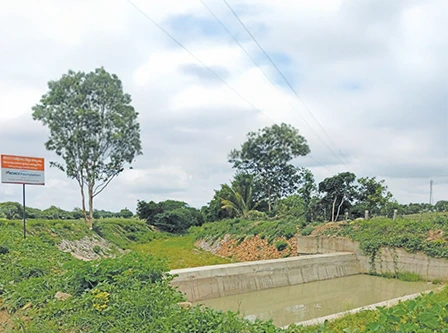
A check dam at Naginonipally village in Mahabubnagar district, Telangana
Impact
515 million litres
Ahar-Pyne restoration water storage in Bihar
242 million litres
Pond rejuvenation water capacity in Gujarat
126 million litres
Groundwater recharge in Maharashtra
92 million litres
Check dam capacity in Telangana
(At March 31, 2025)
- Continuous contour trench is a long narrow hole dug along the level of a slope to capture the rainwater and prevent it from flowing downhill.
- Water absorption trench is a shallow, narrow ditch dug at the ground level, to collect and absorb rainwater into the ground.
- Gabion structure is a stormwater drain made of big rocks held together by steel wire mesh and attached to the stream’s edge.
- Gully plug is a small barrier made of stones or sandbags and built across a gully, a deep channel formed by fast-flowing rainwater.
- Percolation pits are small, deep holes dug into the ground to promote groundwater recharge.
ICICI Foundation’s focus on encouraging the use of clean energy is pivotal to its environmental protection efforts. The Foundation has been undertaking various projects to drive the transition to renewable energy usage in India’s urban and rural areas. In fiscal 2025, it initiated a biogas project in a village in Maharashtra, to provide access to clean energy. As part of the clean energy initiative, the Foundation has also created solar capacity of 12,976.5 (kW) since fiscal 2022, out of which 3,006.5 (kW) was created in this fiscal.
Converting Waste into Clean Energy
ICICI Foundation’s clean energy initiative in Khamkarwadi village in Dharashiv district, Maharashtra, has significantly improved the socio-economic condition for 50 households. In fiscal 2025, the Foundation collaborated with the local community to facilitate the installation of biogas units with capacity of two cubic metre each in 50 households. These units, known as digesters, convert organic waste into biogas (CO2 and Methane) through an oxygen-free process.
Designed for compact installation, the units transform cattle waste into clean energy and organic fertiliser. Each household owns three to four cattle, collectively generating about 2,000 kg of waste daily.
This initiative fosters clean energy access, enhances agricultural productivity and promotes rural waste management, eliminating open-pit cattle waste dumping near sheds. By reducing dependence on firewood and LPG for cooking, beneficiary families save approximately ₹1,200 per month.
The organic fertiliser derived from the biogas process lowers agriculture input costs and enriches soil health. The initiative is projected to raise average family income by over ₹40,000 per annum.
1,500 kg
Monthly organic fertiliser production per household
ICICI Foundation recognises the critical need for effective waste management solutions to safeguard public health and the environment. In fiscal 2025, the Foundation initiated multiple projects under its waste management intervention, providing essential equipment to municipal bodies, and supporting communities in and around Defence Cantonment Boards with waste treatment plants. These efforts have led to the adoption of more efficient waste management practices.
Enhancing Sanitation in Rural Chhattisgarh
Committed to advancing sanitation as a pillar of water management, ICICI Foundation has extended support under the Swachh Bharat Mission (Gramin) by deploying 10 desludging vehicles to Faecal Sludge Treatment Plants (FSTPs).
These vehicles enable the safe collection of 10 lakh litres of sludge from rural households to FSTPs, where the waster undergoes scientific treatment and is converted into ‘Sonkhad’, a nutrient-rich organic compost. This compost enhances soil fertility and supports sustainable agriculture, with proceeds from its sale contributing to the operation and maintenance of the desludging vehicles.
This initiative has positively impacted over 140,000 people across 15 villages in 10 districts of Chhattisgarh. By addressing sanitation and public health needs, the Foundation is not only promoting clean environment but also transforming waste into a valuable resource for rural communities.
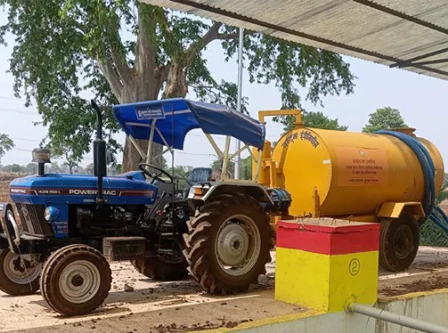
A desludge vehicle deployed at Patora village in Durg district, Chhattisgarh
Optimising Garbage Collection in Assam
ICICI Foundation facilitated improved waste management in two municipal wards of the Kamrup Metropolitan district in Assam, by providing eight garbage collection vehicles. The district generates approximately 550-600 tonnes of waste daily but larger garbage vehicles struggle to navigate narrow lanes and bylanes for effective collection.
The Foundation’s intervention has enabled door-to-door waste collection and timely disposal. Residents in the target areas have been informed on the importance of waste segregation at the household level, fostering responsible disposal practices.
The initiative has significantly improved waste collection efficiency in the targeted wards, reducing backlog issues while enhancing cleanliness in the neighbourhoods. The initiatives have benefitted about 10,000 households and 40,000 beneficiaries. These efforts contribute to the city’s broader sustainability and environmental objectives.
Supporting Waste Management in Army Cantonments and Institutions
ICICI Foundation has assisted the personnel of armed and paramilitary forces in adopting sustainable waste disposal measures by providing waste treatment plants to two Army Cantonment Boards in Rajasthan, the Central Reserve Police Force (CRPF) Group Centre in Telangana, and at Pt. Ravishankar Shukla University in Raipur. These in-house waste processing systems enable efficient treatment, recycling and reuse of organic waste, promoting sustainability and public health.
The waste treatment plant at the Kota Army Cantonment Board, Rajasthan, manages approximately 200 kg of solid waste daily, serving over 2,000 residents in and around the area. At Sri Ganganagar Army Cantonment, Rajasthan, the plant processes 1,500 kg of solid waste each day, catering to over 10,000 residents. Equipment such as organic water digesters and shredders facilitate the effective processing of waste at these sites.
At the CRPF Group Centre in Hyderabad, Telangana, the Foundation’s solid waste management initiative processes 800 kg of waste, yielding 50-80 kg of compost daily for the community.
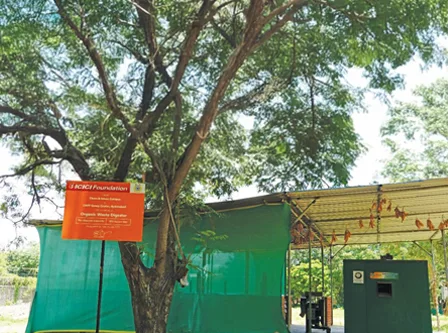
Organic waste digester at CRPF Group Centre in Hyderabad, Telangana
The compost generated at these locations is reused internally for landscaping and agriculture. Additionally, the initiative has reduced external waste transportation by 50% for each facility.
The Foundation has also supported Wellington Cantonment Board, Tamil Nadu, with a waste treatment plant processing up to 1,000 kg of organic waste per day.
Similarly, at Pt. Ravishankar Shukla University, Raipur, Chhattisgarh, the installation of a 200 kg bio-digester efficiently converts food and kitchen waste into nutrient-rich compost.
These initiatives support the communities to effectively manage waste, and use the compost for their day-to-day activities.